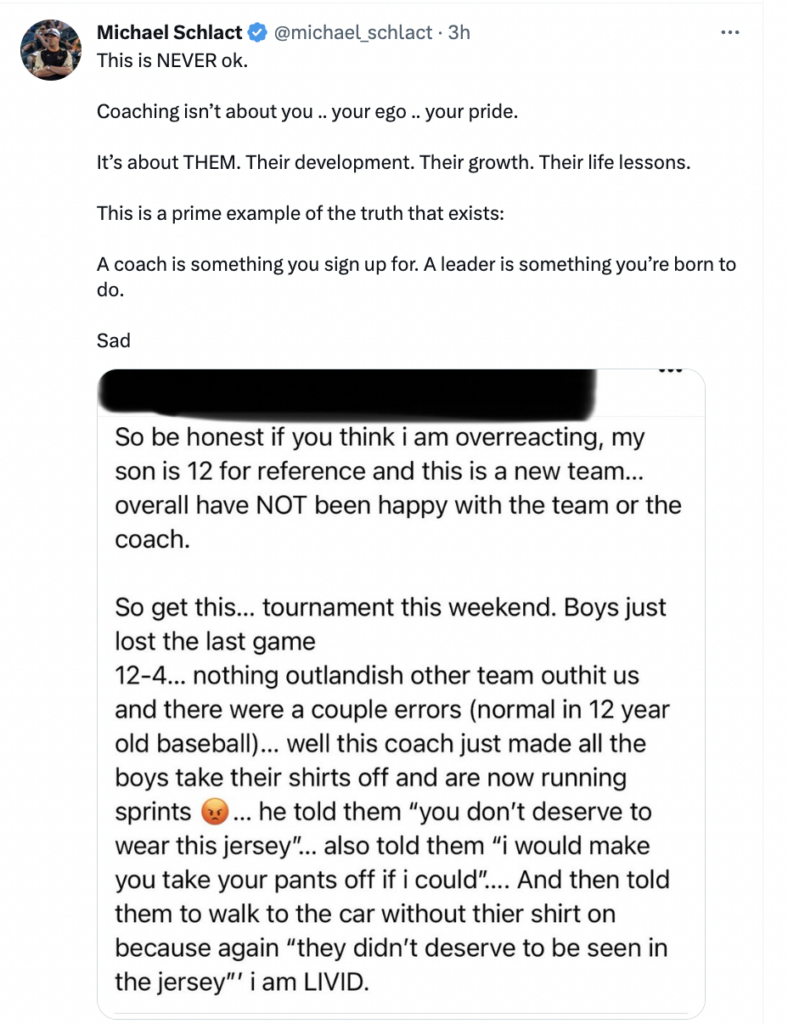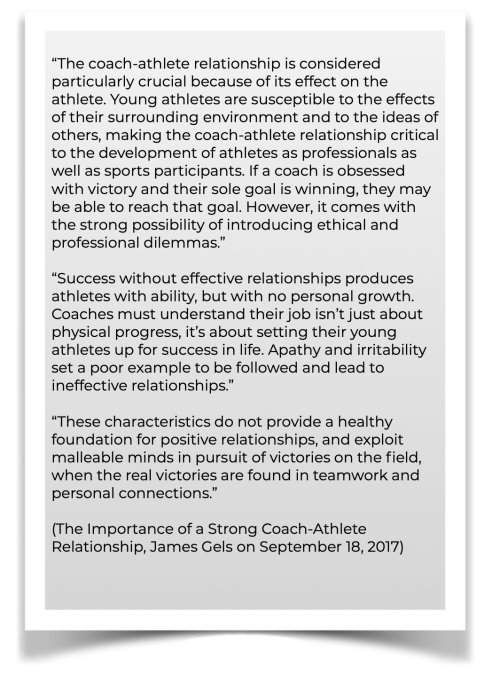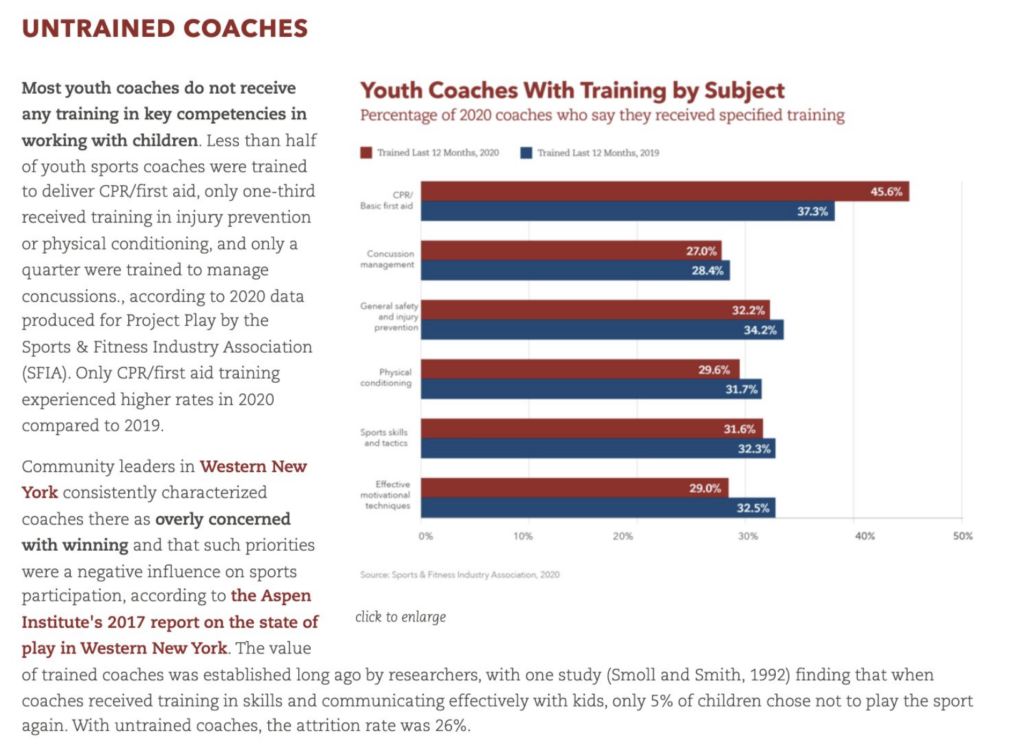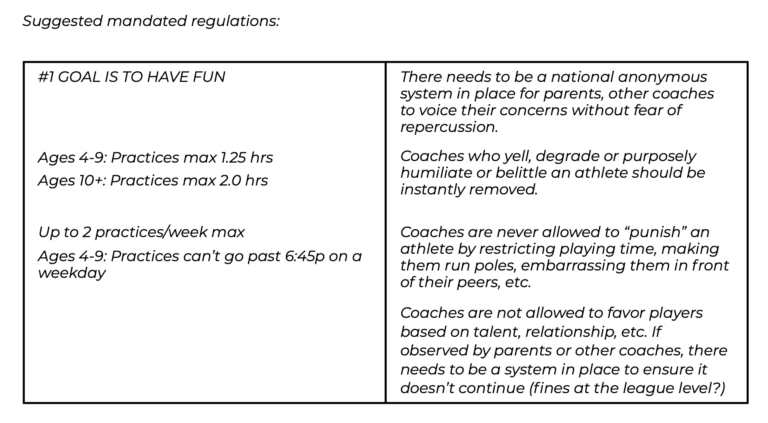Goal: Support coaches in providing resources to lead his/her youth team with the children’s best interest at the very forefront of every single decision made.
Most coaches are not trained in child developmental psychology nor even the sport they are coaching.
What is bullying?
Bullying is an aggressive behavior that occurs repeatedly over time in a relationship where there is an imbalance of power or strength. This manifests itself in many forms, such as physical violence, verbal abuse, social manipulation, and personal attacks. Within coaching physical violence is not usually a major component. It presents itself either verbally, emotionally, or non-verbally. The literature highlights that verbal and emotional abuse, while more common in athletics, has long- term lasting effects on that athletes social and emotional development. The outdated means of using fear tactics, intimidation, fear mongering, shame, guilt and name-calling as methods of motivating athletes for excellence is downright criminal. This type of coach bullying will not motivate a young athlete, but it will pave the road toward burnout, hate and disgust for a once fun and loved hobby.
Coach bullying is hard to quantify in the literature. Due to it being defined by an athlete’s subjective experience. We can make inferences from data collected in elementary and middle schools as a gauge of what is happening on youth athletic fields. In a study by Juvonen (2005), that paper found that nearly 50 percent of 6th graders were claimed to be victims of bullying in the preceding 5-days before the questionnaire. Also, 90% of 4th through 8th graders report some form of bullying within the past.
In 2006, Twemlow, a psychologist researcher, surveyed a sample of over 100 teachers at seven different elementary schools. The results showed that 45% of those teachers admitted to having bullied a student in the past.
Bullying in that study was defined as “using power to punish, manipulate, or disparage a student beyond what would be a reasonable disciplinary procedure.”
This blog post was inspired by this tweet by Coach Schlact.

With this inference, we know that school teachers have more training in areas such as child development and educational methods.
The data from the Aspen Project (2020) shows that less than 33% of youth coaches sampled had training in effective motivational techniques within the last 24 months of the survey. Over 70% of youth coaches are unpaid and volunteers according to the same study and in conjunction the second highest concern of parents are quality or behavior of the coach (78.8% of parents).
It is not farfetched to make the claim that coach bullying is happening at the same rate or higher on the field than it is in the classroom. Said another way, coaches have a higher probability than teachers to show bullying behaviors.
The research of Joseph (2003) acknowledges that verbal abuse has a more profound impact upon its victims’ self- worth than physical attacks.” 33% of verbally abused children suffer from significant levels of post- traumatic stress disorder as the paper states.
Children who are on the receiving end of name- calling are left feeling humiliated, anxious, angry and end up disliking that sport even more. Children who observe the bullying report higher levels of anxiety and also disliked school to a higher degree than those who did not witness any bullying.
There is much more evidence to support the effects of bullying in general and the evidence suggests this data is compounded when it comes from a teacher and/or coach. The major lesson is when a child is bullied by a coach and their teammates observe it, the more the athletes dislike the environment and higher chance the victim will exit the sport.
Communication Expectations: Establish what a positive coach is.
Coaches set the stage for how the season is going to go. There are many very well intentioned and amazing coaches who understand the value of coming together as a team to work on skills, get fresh air, run around for exercise, and overall have fun. These coaches would obviously like their team to win, however, in this youth organization the goal isn’t who wins or loses, but rather to work towards enhancing the athlete from a holistic approach by uplifting, encouraging, providing tips via developmentally appropriate cues, and to leave the child better off than where he/she started.
It is not acceptable to allow coaches to practice more than other teams nor put the emotional needs of their athletes after their desire to win.
The overall experience needs to be fun and coaches should be given enough drills, ideas, and resources to run a standard practice that is age and developmentally-appropriate to ensure all teams are on a level playing field.
Goal:
Coaches who are supported with standardized training, certification or some other standardized set of expectations and behavior are going to give their athletes a better experience.
Kids will have more fun, and they’ll want to keep playing. This is the single most valuable outcome we can orient for, and the most leverage we can have for that outcome is improved coach training.

It is not the coach’s job to seek out “how to coach youth baseball” for best practices, nor is it is in the best interest of the child to have such a significantly varying range of expectations solely based on individual coaches choices/desires. Coaches need be equipped with resources and league-wide standards for dynamic warmups and mobility, proper arm care, safe strength progressions, practice plans, and effective drills. There needs to be a standard (or maybe even certification down the road) that absolutely mandates certain criteria for a coach to be able to lead a youth team (see image for a few suggestions).

Youth athletes’ winning or losing is greatly tied to their self-worth because they have difficulty understanding abstract thought. We want to try and switch this mindset to a growth mindset by introducing different concepts in practice to introduce baseball skills in a better way than we’re doing now.
Rolling out modern, tested and effective new practice plans for coaches to access and implement will not only give coaches confidence in what they are implementing with players, but the kids will notice the shift and acquire skills more quickly, have a more positive experience, it trickles to the parents and everyone wins.

Last year, I put together a 24-page research-backed, data-driven proposal to Little League with a mission to implement a holistic approach to youth baseball with league-wide, data-driven standards that promote and enhance the overall development of youth athletes while simultaneously growing participation in youth softball/baseball worldwide.
With the shared vision to teach lifelong lessons that build stronger individuals and communities, the proposal focused on 9 Key Standards, (backed by replicable data), created by established leaders within the industry with the sole goal to develop and support youth athletes, coaches, and parents throughout the youth baseball experience and in life beyond.
The proposal outlined science-based research and combines the expertise of many of the most prominent names in the youth sports and health industry.
For a full list of references used in my proposal, please email tracy@amplifiedmovement.com. Thank you.
This portion of the proposal was a tag-team effort with Tim Smith, who has his BS in Biomedical Sciences from Keiser University. He also went on to get his Master’s Degree from Purdue University and is currently completing his Ph.D. in Sport Pedagogy at Middle Tennessee State University.
Professionally, Tim was an intern at Cressey Sports Performance and Top Velocity. He has served as a performance coach, bullpen coach, and assistant pitching coach in the Cape Cod League for three summers. He has served as a strength coach at Vanderbilt University, Purdue University, the University of Washington, and Middle Tennessee State. Last season he served as a Sports Scientist for the Tampa Rays and is currently still working in professional baseball as a coordinator of performance science.

